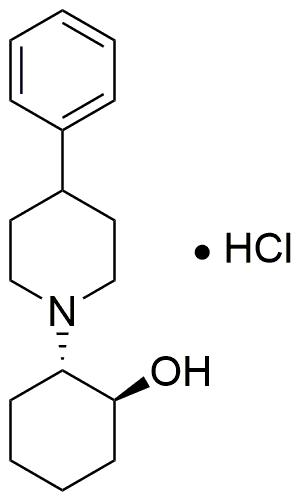D-(+)-Vesamicol hydrochloride is widely utilized in research focused on:
- Neuroscience Research: This compound is often used to study neurotransmitter release and receptor interactions, providing insights into brain function and potential treatments for neurological disorders.
- Pharmaceutical Development: It serves as a valuable tool in drug formulation, particularly in developing medications for conditions like Alzheimer's disease, due to its ability to influence cholinergic signaling.
- Behavioral Studies: Researchers utilize D-(+)-Vesamicol hydrochloride to assess its effects on animal behavior, helping to understand the role of neurotransmitters in cognition and mood.
- Drug Interaction Studies: This compound is used to investigate how various drugs interact with neurotransmitter systems, aiding in the development of safer and more effective therapeutic agents.
- Biochemical Assays: It is employed in various assays to measure the activity of enzymes and receptors, providing critical data for both academic and industrial research.
General Information
Properties
Safety and Regulations
Applications
D-(+)-Vesamicol hydrochloride is widely utilized in research focused on:
- Neuroscience Research: This compound is often used to study neurotransmitter release and receptor interactions, providing insights into brain function and potential treatments for neurological disorders.
- Pharmaceutical Development: It serves as a valuable tool in drug formulation, particularly in developing medications for conditions like Alzheimer's disease, due to its ability to influence cholinergic signaling.
- Behavioral Studies: Researchers utilize D-(+)-Vesamicol hydrochloride to assess its effects on animal behavior, helping to understand the role of neurotransmitters in cognition and mood.
- Drug Interaction Studies: This compound is used to investigate how various drugs interact with neurotransmitter systems, aiding in the development of safer and more effective therapeutic agents.
- Biochemical Assays: It is employed in various assays to measure the activity of enzymes and receptors, providing critical data for both academic and industrial research.
Documents
Safety Data Sheets (SDS)
The SDS provides comprehensive safety information on handling, storage, and disposal of the product.
Product Specification (PS)
The PS provides a comprehensive breakdown of the product’s properties, including chemical composition, physical state, purity, and storage requirements. It also details acceptable quality ranges and the product's intended applications.
Certificates of Analysis (COA)
Search for Certificates of Analysis (COA) by entering the products Lot Number. Lot and Batch Numbers can be found on a product’s label following the words ‘Lot’ or ‘Batch’.
*Catalog Number
*Lot Number
Certificates Of Origin (COO)
This COO confirms the country where the product was manufactured, and also details the materials and components used in it and whether it is derived from natural, synthetic, or other specific sources. This certificate may be required for customs, trade, and regulatory compliance.
*Catalog Number
*Lot Number
Safety Data Sheets (SDS)
The SDS provides comprehensive safety information on handling, storage, and disposal of the product.
DownloadProduct Specification (PS)
The PS provides a comprehensive breakdown of the product’s properties, including chemical composition, physical state, purity, and storage requirements. It also details acceptable quality ranges and the product's intended applications.
DownloadCertificates of Analysis (COA)
Search for Certificates of Analysis (COA) by entering the products Lot Number. Lot and Batch Numbers can be found on a product’s label following the words ‘Lot’ or ‘Batch’.
*Catalog Number
*Lot Number
Certificates Of Origin (COO)
This COO confirms the country where the product was manufactured, and also details the materials and components used in it and whether it is derived from natural, synthetic, or other specific sources. This certificate may be required for customs, trade, and regulatory compliance.


